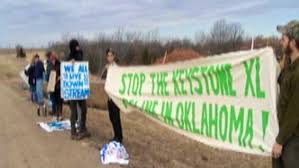
A move started three years ago by the Oklahoma legislature to protect energy pipelines and projects from protesters saw another state adopt similar efforts this week.
Alabama lawmakers this week advanced legislation to add new criminal penalties to nonviolent protests against pipelines and other fossil fuel projects, setting a course to become the fourth state to enact such measures amid the chaos of the coronavirus pandemic according to HuffPost.
It started when protesters attempted to block construction of the original Keystone pipeline when it was constructed in Oklahoma.

The bill would designate virtually any oil, gas or coal equipment or facilities in the state as “critical infrastructure” and severely prohibit where aerial drones that watchdog groups depend on to track pollution can fly. The legislation would make any action that “interrupts or interferes” with pipelines, storage depots or refineries a Class C felony, punishable with at least one year in prison and up to $15,000 in fines.
Kentucky, South Dakota and West Virginia enacted similar measures in March, just as states started implementing lockdowns to contain the outbreak of COVID-19, the respiratory illness caused by the virus.
The Alabama Senate passed the bill on March 12, just before state officials, alarmed at the spread of the virus, postponed legislative hearings for a month. When the capitol reopened in Montgomery on May 4, state Democrats remained in their home districts, but enough Republican lawmakers returned to restart work on the legislation. On Monday, the House version of the bill was introduced and referred to the committee that oversees utilities and infrastructure.
On Thursday, lawmakers hit pause again, pledging to work instead on budgets, bond issues for school and college funding, and local bills until the next legislative session.
State Sen. Cam Ward, the lead Republican championing the measure, told HuffPost the bill “will not be voted on this session due to the COVID-19 delay in our session.”
But this is “a high-priority bill,” said Michael Hansen, executive director of Gasp, a clean-air advocacy group based in Birmingham. “So the moment they get a chance, they will pass it,” he said.
Ward declined to comment on why the legislation was necessary in Alabama.

Alabama has no major pipelines in the works. But the danger such projects pose was made clear in 2016, when the Colonial Pipeline Co. — which boasts the nation’s largest refined-product pipeline system — spilled 11,800 barrels of gasoline in Alabama’s rural Shelby County.
A month later, the same pipeline exploded, killing at least two workers. In 2018, the Georgia-based firm agreed to pay $3.3 million in state fines but faced at least one lawsuit over alleged contamination of land, which was dismissed only in January.
State rules do not require lobbyists in Alabama to disclose the legislation for which they advocated. But filings show that both a subsidiary of Koch Industries, which owns the biggest stake in Colonial, and Colonial itself lobbied Alabama lawmakers during the first three months of this year.
Exxon Mobil Corp., Chevron Corp., Dow Chemical Co. and the utility giant NextEra Energy also reported lobbying in the first quarter of this year. Canadian pipeline builder Enbridge registered as a lobbyist in 2020 but did not file a first quarter report.
An Exxon Mobil spokeswoman could not immediately confirm whether the company lobbied on the Alabama legislation but said: “Generally, industry would be supportive of something like that.”
None of the other companies responded to requests for comment on Friday.
The bill, known as SB45, appears aimed at proactively stopping demonstrations against any fossil fuel project. “It would throw a wet blanket on any sort of protest or civil disobedience,” Hansen said. “The penalties they included are really draconian.”
The timing of the bills’ passage in all four states may be a coincidence, but the similarities in the legislation are not. The fossil fuel industry’s political allies started promoting harsh new restrictions on protests shortly after the months-long standoff over construction of the Dakota Access Pipeline — an oil conduit that environmentalists and Native American activists rightly predicted would leak — came to an end as security forces mounted a military-style takeover.
In May 2017, less than three months after police rounded up the remaining protesters, Oklahoma enacted a new law protecting pipelines as critical infrastructure. Soon after, the American Legislative Exchange Council — the conservative policy shop funded by big business and right-wing billionaires — drafted a generic bill dubbed the Critical Infrastructure Protection Act and began shopping it around to state legislators.
Source: HuffPost






